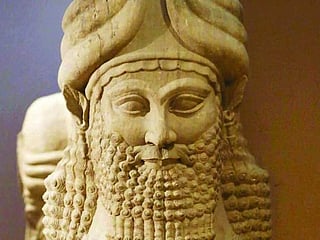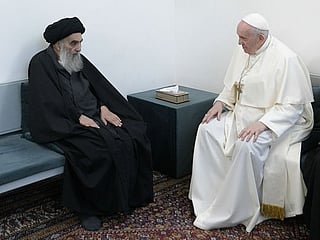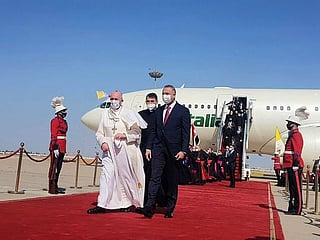Who will enter Iraq’s next parliament? The main players in Sunday’s elections
After 2 years of protests and 600 deaths, Iraqis heads to vote. Will it bring a change?

Damascus: Iraqis will go to the polls with early elections on Sunday, a universal demand claimed by angry demonstrators who took to the streets of Baghdad exactly two years ago, asking for change, accountability, better jobs, better services, and revamp of the political system. Six hundred of those activists were shot dead by the Iraqi security services and another 10,000 were injured, while many were hauled off to prison.
Security forces, displaced people and prisoners cast ballots in the election on Friday, two days before the rest of the country.
In Baghdad, security was tight as dozens of army cadets lined up at a polling station set up in a school, after voting got underway at 7am (0400 GMT).
More than one million security force members are able to vote on Friday in the locations where they are stationed, because voting in their home regions - as other citizens will do - could prove challenging for those in distant locations.
But the 160,000 members of the powerful Hashed Al Shaabi are ineligible for early balloting.
Also casting ballots Friday are around 120,000 displaced people, some of them living in 27 camps, and more than 600 prison inmates.
3,449 vie for 329 seats
There are 3,449 candidates vying for 329 seats in parliament in Sunday's vote, which will be the sixth held since the fall of Saddam Hussain after the US-led invasion of Iraq in 2003. More than 24 million of Iraq's estimated 38 million people are eligible to vote. The new electoral law theoretically favours local candidates - which means tribal figures or local potentates - as the number of electoral districts has been increased to 83. Previously, under the list-based system, Iraq's electorate was divided according to the 18 governorates. Now, all across the country, many candidates are calling themselves "independents", despite having had partisan affiliations in the past.
When coming to power in May 2020, Prime Minister Mustafa Al Kadhemi promised accountability and justice but he has been unable to deliver on both, given that many of those who fired at the demonstrators back in 2019 were affiliated with the big Shiite parties that dominate the Iraqi Parliament. Instead, he promised to appease the masses with early parliamentary elections, being the firth since downfall of Saddam Hussain back in 2003.
Most of the activists of 2019, who label themselves as “Tishrinis” (Octoberists, in reference to October Revolution), have called for a boycott of Sunday’s election. They believe that nothing will change since the vote will be handled by the very same politicians who are responsible for all the ills of Iraq. A handful of activists will be running, however, like Alaa Al Rikabi, a pharmacologist who heads the Imtidad Movement.
They are too weak and divided, however, and have no chance at defeating the bigger, wealthier, and far more organized Iran-backed parties, who already control the lion’s share of seats in the current chamber, and are expected to return to power in the upcoming elections.
Here is a look at the main competitors in Sunday’s elections, and what their chances are at entering Iraq’s next parliament.
Sairoun: An all-Shiite party headed by the powerful cleric Moqtada Al Sadr, Sairoun currently controls 54 out of 329 seats in the Iraqi Chamber. Popular among the poor and needy, with a significant support within the Shiite middle class, Sairoun relies on the religious and political clout of its founder, the son of a legendary Shiite cleric named Ayatollah Mohammad Sadiq Al Sadr, who was killed in 1999, reportedly at the orders of Saddam Hussain.
Moqtada Al Sadr rose to fame after the 2003 invasion of Iraq, first for leading an insurgency against the Americans and them as a kingmaker in Iraqi politics, responsible for the making and breaking of prime ministers, starting with Ebrahim Jaafari in 2005 onto Al Kadhimi in 2020. Many western analysts erroneously claim that he handpicks premiers according to their loyalty to Iran, but a sounder assessment is that he chooses them based on their loyalty to Al Sadr.Sairoun: An all-Shiite party headed by the powerful cleric Moqtada Al Sadr, Sairoun currently controls 54 out of 329 seats in the Iraqi Chamber. Popular among the poor and needy, with a significant support within the Shiite middle class, Sairoun relies on the religious and political clout of its founder, the son of a legendary Shiite cleric named Ayatollah Mohammad Sadiq Al Sadr, who was killed in 1999, reportedly at the orders of Saddam Hussain.
Al Sadr was the first to call for early elections last February, even asking for international monitors. He then seemed to change his mind, calling for a boycott, then returned to announce that he would be running with a big list, which he hopes will increase Sairoun’s share from 54 to 100 MPs. That might happen if there is a low turnout, where only his supporters vote in Shiite constituencies (like the case in 2018 when voter turnout dropped from 61% to 44%).
Al Sadr is not hiding his ambition at wanting the next prime minister to be a member of Sairoun, with one of his MPs, Hakim Al Zameli, saying: “If the premiership goes to any other party than the Sadrist movement, it means that the elections are rigged.”
Fateh Alliance: The first to challenge Sadr for the Shiite vote is the Fateh Alliance, an Iran-backed coalition of Shiite parties that came in second during the 2018 elections, with 48 out of 329 seats. Headed by Hadi Al Amiri, it includes major Shiite components of the Popular Mobilisation Units like Badr, Asaib Ahl Al Haq, their political win Al Sadiqoun, Kataib Hezbollah, and Kataib Imam Ali.
Badr, which is headed by Amiri, was founded by Iran and used to fight Iraqi troops during the Iran-Iraq War of the 1980s. Loyalty to Iran unites them all, and they are campaigning on a counterterrorism ticket, claiming that they were the ones to eradicate the Daesh-threat in Iraq. They also have a common enemy in Al Khadimi, whom they helped bring to power last year, before he tried clipping their wings by trying to arrest members of Kataib Hezbollah. Fateh Alliance leaders consider Kadhimi as both a backstabber and opponent of Iran, and they will work on bringing him down the minute they return to Parliament.
State of Law Coalition. Another Iran-backed party, it is headed by former Prime Minister Nouri Al Malki, under whose term Daesh emerged to overrun entire swaths of Iraq. It was once the most powerful Shiite party of Iraq, with 92 MPs in the 2014 Parliament. It representation was slashed to 25 MPs, however, and is expected to drop even further on Sunday due to Al Malki’s corruption, nepotism, and autocracy. It had only managed to win the lion’s share of seats because Al Malki had the entire state apparatus at his disposal, and was backed at the time by Moqtada Al Sadr.
National State Forces Alliance: Another Shiite-block, it is composed of politicians and clerics who are trying to come across as independent of Iran, competing for Shiite votes with Al Sadr, Al Malki. and the Fateh Alliance. One of its leaders is former Prime Minister Haidar Al Abadi, who was forced out of office back in 2019 because he famously agreed to abide by US sanctions on Iran, instructing Iraqi banks to stop doing business with their Iranian counterparts.
Another heavyweight is Ammar Al Hakim, scion of a leading Shiite family who once led the Supreme Council for the Islamic Revolution in Iraq (SCIRI), an Iran-backed and Iran-founded organisation. Banking on a historic feud between his family and that of Al Sadr, he played an important role in fighting Moqtada during the post-Saddam era, investing in his control of the Iraqi Ministry of Interior, which was used to arrest, torture, and liquidate Ammar al-Hakim’s opponents.
In 2017, Al Hakim staged what many believed was a soft defection from Iran, breaking from SCIRI to form the Hikma Movement. On paper it called for demilitarisation of Iraqi society and the monopolization of weapons in the hands of the state, while insisting that it was open to Sunnis and was not an all-Shiite party. Hikma currently holds 19 seats in Parliament, a number that according to early polling, is expected to remain intact.
Haraket Huqouk. A dangerous newcomer to Iraqi politics, Haraket Huqouk is an all-Shiite party headed by Hussain Mouanes (aka Abu Ali Al Askari), a former member if the US-sanctioned Kataib Hezbollah. Although Mouannes insists that he has long parted ways with Kataib Hezbollah, some believe that he is running with their secret blessing, while others describe as a defector from the ruling oligarchy.
An electrical engineer by training, he has now devoted himself fully to politics and drawn up a large list of 32 candidates, mostly men and women in their mid-forties, all working professionals with advanced university education. They are competing with Asaib Ahl Al Haq, Malki, and Sadr in 10 Shiite majority districts, known for their loyalty to traditional Shiite figures, including Sadr City, the traditional powerbase of the Sadr family, where Mouanes is standing as candidate.
The Sunni Parties
There are three major Sunni groups running for Sunday’s elections. One is the National Salvation Project, with a strong base in Mosul, headed by former Parliament Speaker Osama Al Nujaifi, who is considered close to Turkey and its president, Recep Tayyip Erdogan.
During the 2018-2021 chamber he commanded a bloc of 14 MPs and is now running against his successor at the Iraqi chamber Mohammad Al Halbousi, head of the Taqaddum Party, competing for seats in northern and western Iraq and considered close to Saudi Arabia.
A third, unexpected opponent is the independent Khamis Al Khanjar, a 56-year old Sunni tycoon from the city of Fallujah, who likes to position himself as the Rafik Hariri of Iraq. Khanjar is marred with murky business connections, former links to the Islamic State and connections to Saddam Hussain’s family—three sins that his opponents are using to discredit him. He is the wealthiest of Sunni candidates, whoever, and is investing his money to buy off votes.
Kurdish Parties
The two historic Kurdish parties taking part in the upcoming elections, are the Kurdistan Democratic Party (KDP) of Arbil and the Patriotic Union of Kurdistan (PUK) of Suleimaniya. They face no serious challenge from anybody outside their constituency and are competing with each other for the Kurdish vote amidst overriding fears of a withdrawal of US forces by December that will leave them vulnerable to Iran-backed politicians. During the 2018 elections, the KDP won 25 seats while PUK got 18, a total of 43 seats for an overall Kurdish bloc of 58 MPs (the rest of them being independents and representatives of smaller Kurdish parties).
Sign up for the Daily Briefing
Get the latest news and updates straight to your inbox









